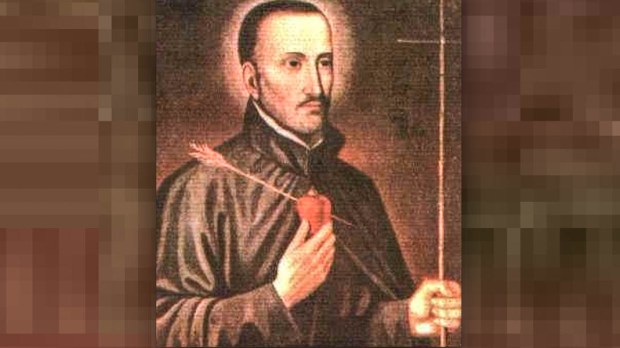St. Roque Gonzalez didn’t want attention. He didn’t want special treatment. He didn’t even want a comfortable bed and a good meal. He only wanted Christ.
Born to noble Spanish parents in Paraguay, Roque (1576-1628) had a life of luxury ahead of him. But while many Spaniards around him took every opportunity to seize power, money, and comfort, Roque clung to the cross.
Prayerful from a young age, Roque was expected to pursue a priestly vocation, but his humility nearly thwarted that call. He didn’t feel himself worthy to be a priest but his objections were soon overcome and he was ordained at 23.
It quickly became evident that he was a man of intelligence, likely to be called upon to become a bishop one day. For love of Jesus, Roque had submitted to priestly ordination, but the episcopacy was more than his humble heart could accept. Fleeing worldly honors, he entered the Society of Jesus, knowing that Jesuits were very rarely made bishops.
Fr. Gonzalez wasn’t just avoiding ecclesial honors, though; he was fighting to serve the poorest of the poor. As a child, he had learned both Spanish and Guaraní and the first decade of his priesthood was spent serving the native peoples in Córdoba and beyond. His love for the missions drew him to the Jesuits, who sent him to as-yet-unevangelized regions of Brazil.
Fr. Gonzalez was eager to preach to the native peoples who were living without the joy of Christ, but he sought also to defend them from slavers and from the unethical practices of the Spanish government. In an attempt to force natives to assimilate, the policy was to relocate them from villages to cities, separating them from the land that had sustained them for generations upon generations. Gonzalez chose instead to establish communities for the natives within villages, “reductions” (from the Spanish for “to bring together”) in which the Guaraní people governed themselves, free from the exploitation of conquistadors.
These settlements, from which slave traders were banned, were self-supporting, designed to affirm the dignity of the Guaraní. There, in the communities they ran, Fr. Gonzalez ate with them, lived like them. When they went hungry, so did he. He was a farmer, a doctor, an architect when needed. He taught the people to farm, to raise sheep and cattle. He refused to demand special treatment because of his aristocratic origins, nor did he look down on their “less civilized” ways. He was the servant of his people, not their ruler.
The love he had for them made Fr. Gonzalez popular, and through him, Christ. Where the Guaraní had been hesitant to be baptized before, fearing that it would give the Spaniards more power over them, they saw in Gonzalez a model of Christ’s love and were willing to accept him.
Rather than just demanding that they become dark-skinned Spaniards, Fr. Gonzalez respected their customs and brought as many of their traditions as he could into worship and evangelization; on special feast days, Mass was followed by dancing, drums, games, and even fireworks. Hearing of his success, other Jesuits came from Spain to join Fr. Gonzalez in the mission.
Even Voltaire, a noted enemy of the Church, spoke highly of his work, saying, “The Paraguayan missions reached the highest degree of civilization to which it is possible to lead a young people. In those missions, law was respected, morals were pure, a happy brotherliness bound men together, the useful arts and even some of the more graceful sciences flourished, and there was abundance everywhere.”
As Fr. Gonzalez moved through South America founding reductions, people flocked to them; at once point, over 80,000 people lived in the settlements the Jesuit had started. Not everybody was thrilled by his work, however. Certain leaders among the Guaraní people were suspicious, concerned that he would destroy their power and the native way of life. Not long after the arrival of Sts. Alonso Rodriguez and Juan de Castillo, Spanish Jesuits, a local shaman had the three assassinated, their blood shed for love of Christ and his people, Guaraní both baptized and unbaptized.
St. Roque Gonzalez did important work, paving the way for the many American saints we know today. He also did important work for the recognition of the dignity of the native peoples, fighting for their equal rights and protection from abuses. On November 17, his feast day, let’s pray for just solutions to racial inequities and for the courage to be humble, whatever the cost. St. Roque Gonzalez, pray for us.

